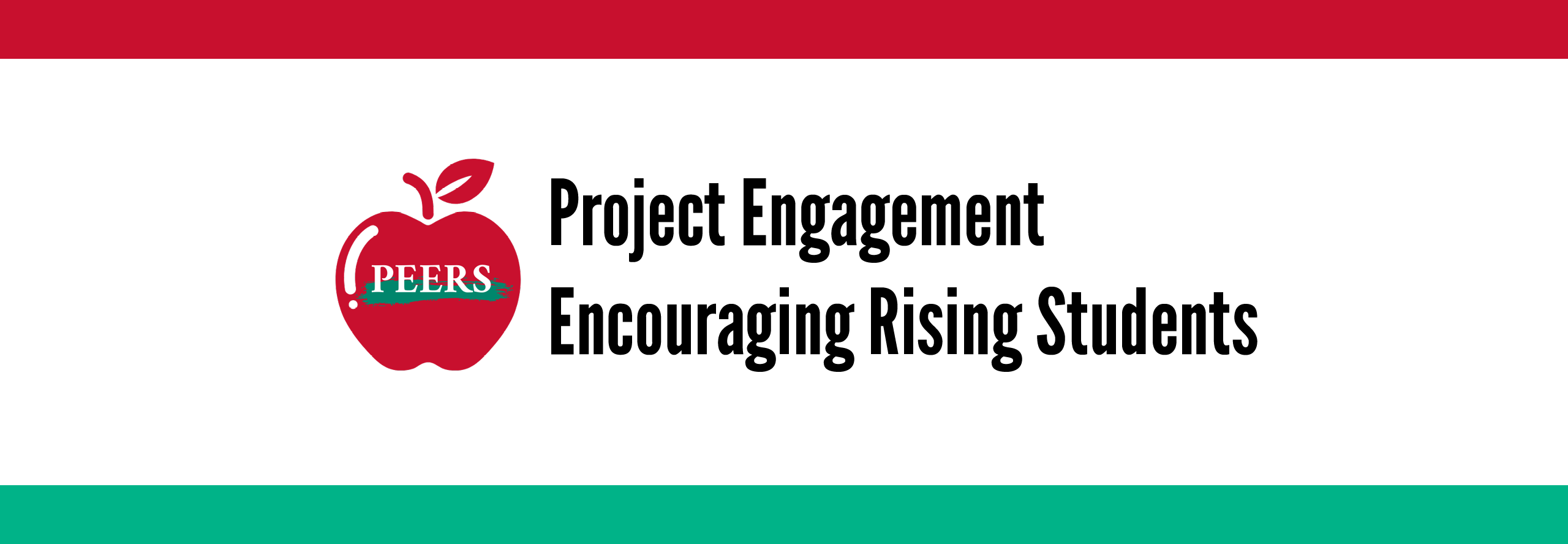
Peers
PROJECT DESCRIPTION
23’- 24’ Congratulations to our PEERS Participants!
MEMBER EXPECTATIONS
Undergraduate mentors will facilitate 1 hour weekly meetings with high school teams at one of our partner schools. Mentors will facilitate learning modules focusing on the social determinants of health and guide their student teams in designing community health projects. Mentors can expect to build a natural mentorship with their teams, sometimes providing advice about college, careers, and life.
Undergraduates may also choose to sign on instead to become a PEERS intern and aid in designing and implementing engaging events for the entire program. In the past, this team has created recruitment materials, hosted the ‘Pizza with Professionals’ Career Lunch, and used directed acyclic graphs to demonstrate the impact of PEERS.
PAST PROJECTS
2022-2023
1st Place - Postpartum Depression: Beyond the Blue
Alyssa Sanchez, Maria Perez, Layla Beltran
2nd Place - Kanes for Kid
Jaylin Espinoza, Ashley Vasquez
3rd Place - Lupus in Colo
Halie Nguyen, Kimberly Rangel
Honorable Mentions
Power of Pink: Leilany Urbina, Yarely Galaviz
Helping Teachers Help Students: Josiah Beale, Vicente Flores
Sidewalk Safety: Kevin Aldana, Aaron Manning
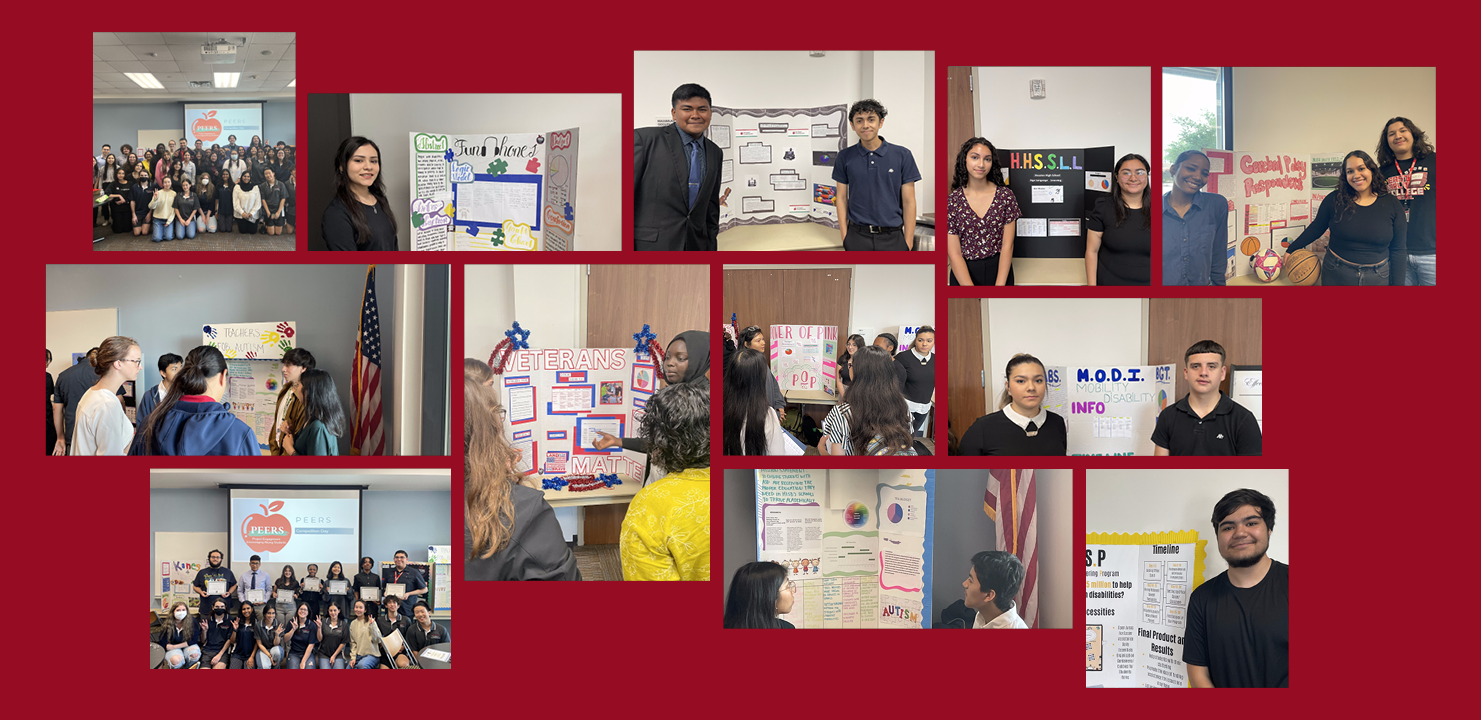
2021-2022
If you had 5 million dollars, how would you improve mental healthcare in your Houston community?
1st Place: Leslie Perez, Maury Alvarez, Ava Harris, and Toni Pipes - Young Women’s College Preparatory Academy
Proposed the implementation of aid centers across low-income Houston communities which target foster teenagers aged 15-18 in need of mental health assistance. Centers would feature group counseling and career endorsing activities and ideally prevent poor mental health among this susceptible population.
2nd Place: Josiah Johnson, Gwyneth Rose Perez - Austin High School
They developed a series of social events that target the mental health of ethnic minority groups in the Houston community. Events center around career networking opportunities and biking to allow a sense of community among marginalized minority groups.
3rd Place: Tyler Hernandez, Austin Hebert, Miranda Medina, Gabriela Corvera - Mission Squash
Improve adolescent mothers' mental health and stability through integrating mental health clinics with existing HISD high school child care centers. The program would offer therapy, daycare, birth control accessibility, and parenting guidance to struggling young mothers.
Honorable Mention: Diego Giovanni Garcia Tapia, Jose Luis Garcia Saldana, Scarlett Sandoval - Mission Squash
Put forward a series of educational seminars in Houston schools centered around mental and physical abuse in young girls aged 12-18. The program would introduce trained experts in abuse to integrate into partner schools and offer counseling and guidance to students and staff.
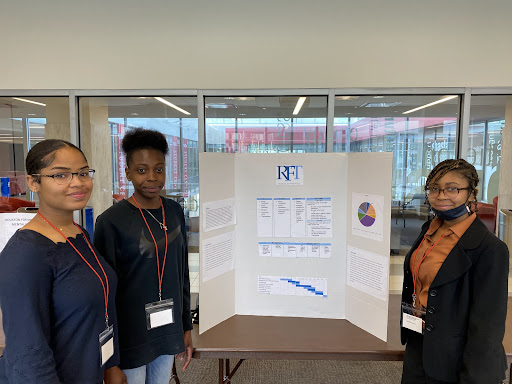
2020-2021
If you had 5 million dollars, how would you improve the wellness in your Houston community?
1st place: Anjali Agrawal, Favor Igwilo, Ibtesam Jamal - Harmony School of Innovation
They developed an organization that implements community fridges within the Third Ward of Houston, adjacent to the UH campus. In their solution, they foresaw success by directing 50,000 pounds of food to the community and attending food fairs. Their primary focus was to educate the community on nutrition, sustainability, and resolving food insecurity.
2nd place: Zeba Motiwala, Ayesha Hussain, Saira Hussain, Jasmine Wani - Clements High School, and Stony Point High School
Eliminate the language barriers, lack of transportation, and cultural stigmas that prevent refugee youth from seeking mental health treatment. Based on the student's experiences with the refugee community, they wanted their program to serve as a support community for the refugees, volunteers, and doctors.
3rd place: Mansi Patel, Zaynah Yousuf, Naisha Vinayak, Sudharshini Prasanna- Clements High School
Focus and improve the literacy rates of the Houston refugee youth population by partnering with Las Americas Middle School. They aimed to increase performance levels by conducting qualitative analysis regarding their interventions. Based on their analysis, they would also implement identical methods in schools with refugee populations.
Honorable Mentions: Jaqueline Villanueva Govea- KIPP Sunnyside High School
Implementing a “neighborly depot,” which the student defined as a physical building where residents in the Houston community can come to receive supplies and apply for jobs. The intent was to build a social support system that was sustainable and attentive to every community member’s needs.
Honorable Mentions: Diya Kashyap, Maria Siddeeque, Madeeha, Siddeeque, Sheena Gupta - Austin High School, Clements High School
They developed a program called Wonders for Women after Incarceration (WWAI), which was designed to support post-incarcerated women on their journey to recovery from augmented mental health issues. The organization aimed to institute a successful transition back into society for these women by providing them shelter, healthcare, transportation services, employment, and legal resources. It also provided a robust social community to uplift their spirits and help strengthen them during their fight.
2019 - 2020
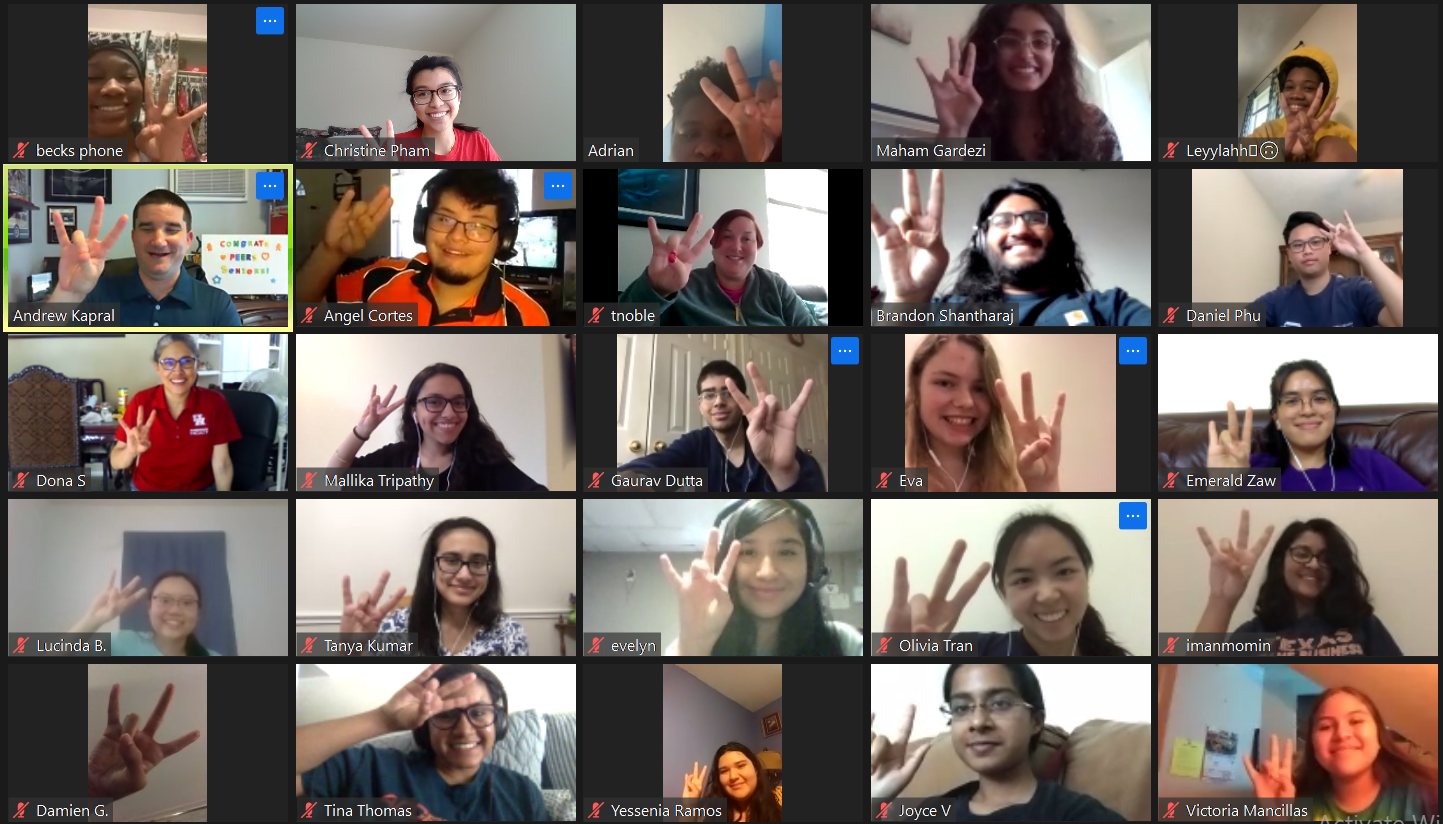
If you had 5 million dollars, how would you improve preventative care in your Houston community?
1st Place: Leylah Walker-Battle, Adrian Williams, Rebecca Asare - Lamar High School
Student-led education programs are facilitated through a website and app encouraging safe sex practices for teens.
2nd Place: Eva Reese - Lamar High School
Telehealth provides medical services to high school students who cannot access medical services outside of school.
3rd Place: Evelyn Osorio, Angel Cortes, Erik de la Cerda - Austin High School
A holistic approach to overcoming homelessness that addresses all social determinants of health.
2018 - 2019
If you had 5 million dollars, how would you alleviate the impact of Hurricane Harvey on the Houston community?
Best Design & Community Health Worker Favorite:
Azucena de la Cruz, Monica Arteaga, Estevan Gonzalez - YES Prep 5th Ward
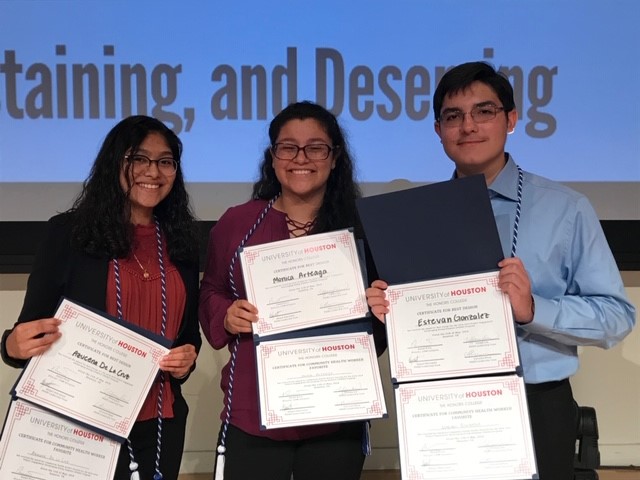
Most Innovative Design:
Jasmine Jenkins, Yesenia Mairena - Austin High School
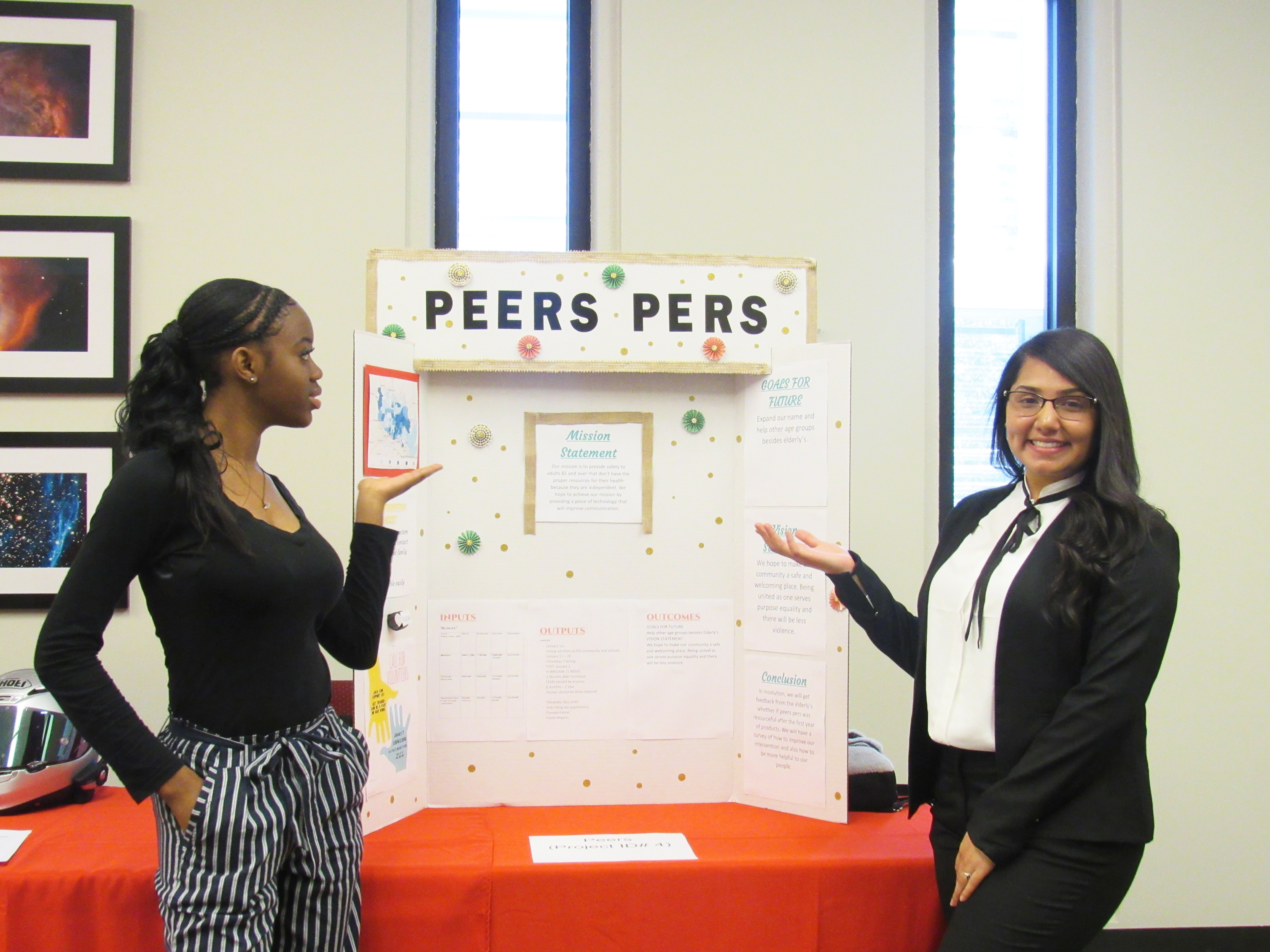
PROJECT HEADS

Haley Romine, B.S. in Biology, Sophomore

Kendyl Donald, B.S. in Health, Senior

Imani Wasonaga, B.S. in Psychology, Junior

Marcus Omwanza, B.B.A in Management Info Systems, Junior

Angela Nguyen, B.S in Psychology, Sophomore
EFFICACY OF AN UNDERGRADUATE-LED NEAR-PEER MENTORSHIP PROGRAM ON HIGH SCHOOL STUDENT ATTITUDES TOWARDS COMMUNITY HEALTH
Project Engagement Encouraging Rising Students (PEERS) is an undergraduate-run mentorship program that targets grades 9-12 in high schools and organizations across Houston. The primary objectives of PEERS include improving understanding of community health among young members of at-risk communities through project-based-learning education, providing an enriching mentorship experience between high school students in Houston and University of Houston students, and offering opportunities for professional and academic development to both high school students and university undergraduates. As part of the PEERS curriculum, high school students completed reflective journaling designed to track and measure growth in three target topics: (1) their personal goals, (2) their interests and views on health in communities, and (3) their relationship with their mentor group. Data from this evaluation will be used to assess the impact of PEERS on student fulfillment, attitudes, and understanding of community health topics.
About the Authors
Tony Trabulsi (B.S. in Human Nutrition), David Hartman (B.S. in Psychology, Minor in Medicine and Society), and Vyshnavi Davuluri (B.S. in Biology, Minor in Medicine and Society) served as Project Heads for the 2021-2022 academic year. In addition to implementing the PEERS program, they designed a qualitative internal evaluation to measure and improve the PEERS experience for high school students. The evaluation was presented at the Texas Educator’s Academies Collaborative for Health Professions Southeast (TEACH-S) conference in May 2022. The authors aim to publish the evaluation once the data evaluation has been completed.
MENTORED PROJECT-BASED COMMUNITY HEALTH EDUCATION FOR TEENS
Arwa Hasnain, Lucinda Ba, Maham Gardezi, Daniel Phu
This project describes the organizational and education elements incorporated into the PEERS Program. Near-peer mentoring, capacity building and feedback loops are all aspects that were discussed in depth. By utilizing the information they have collected, PEERS has continued to grow in size and progress in its integrated community health mentorship program.
All four of the 2020-2021 Project Heads chose to get involved in this research project to evaluate the program. This project's information indicated PEERS' strengths and weaknesses when delivered online.
EFFICACY OF A COMMUNITY HEALTH DRIVEN MENTORSHIP
Efficacy of A Community Health Driven Mentorship
Project Engagement Encouraging Rising Students (PEERS) implements an undergraduate-high school mentorship to begin conversations about community health, empowering high school students to address issues relevant to their community through project-based learning. This study focuses on mentor growth that is often overlooked in the mentee-mentor relationship. This study utilizes a qualitative approach, using questionnaires and virtual focus groups over three checkpoints to assess growth in (1) awareness and interest in community health (2) leadership and professional development, and (3) feeling competent as simultaneous community health educators and advocates.
About the Authors
Hannah Wright (BS in Liberal Studies) and Christian Bernard Alarcon (M.S. in Biology) served as mentors for the 2019-2020 academic year. They also participated in the PEERS Special Projects Team to help with logistics and behind-the-scenes planning. This year, they designed a program evaluation utilizing a qualitative approach to evaluating undergraduate mentor growth through a series of three checkpoints. In April, their findings were presented at the Texas Educator’s Academies Collaborative for Health Professions Southeast (TEACH-S) conference. They will be presented at the October American Public Health Association (APHA) Meeting & Expo. (Hannah Wright also has a minor in Biology, Nutrition and Medicine, and Society.)
PUBLICATIONS
- Unique Program Brings UH Students and Community Together to Tackle Public Health Issues
- Arete 2019
- Public Health Webinar Discusses Healthcare's Future
- PEERS Program Goes Remote
- Pharis Fellowship Scholars Start Individual Experiments to Improve Health of Houston Community
- UH Healthcare Organizations Discuss Racial Disparities in Medicine
- UH CHWI Helping Houston Communities Impacted by COVID-19
- A Glimpse into the PEERS Program
- PEERS Competition Addresses Community Health Issues
- Student Spotlights
- Engaging Data Science and Public Health







